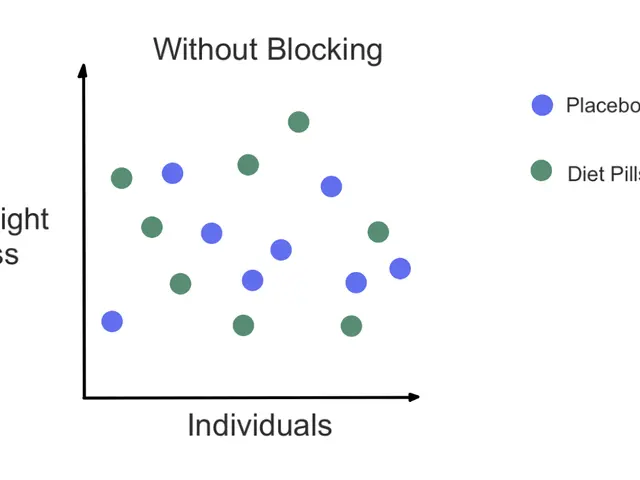Vegan and Vegetarian Diets: Distinctions, Advantages, and Health Comparison
In the realm of plant-based diets, two popular choices stand out: Lacto-Ovo-Vegetarianism and Veganism. Both diets exclude meat, fish, and poultry, but they differ in their inclusion of dairy products and eggs.
Lacto-Ovo-Vegetarianism, as the name suggests, includes dairy products and eggs, in addition to plant-based foods. This dietary choice offers a versatile option for those who want to reduce their consumption of animal flesh while still consuming dairy and eggs.
On the other hand, Veganism is a stricter form of vegetarianism that excludes all animal products, including dairy, eggs, and even honey. This diet is entirely plant-based and also avoids products that are tested on animals or derived from animal sources.
When it comes to weight loss, studies suggest that a vegan diet may be more beneficial. This is due to its higher alkalizing potential and lower dietary acid load, which can contribute to weight loss. However, the Lacto-Ovo-Vegetarian diet can also lead to weight loss, but it may require more effort due to the inclusion of dairy and eggs, which can be high in calories and saturated fat if not consumed in moderation.
Both diets can provide adequate nutrition if properly planned. However, vegans may need to pay closer attention to their intake of certain nutrients like vitamin B12, omega-3 fatty acids, and calcium, which are commonly found in animal products. Lacto-ovo vegetarians can get these nutrients from dairy products and eggs.
Both diets have been associated with reduced risk of certain diseases, such as heart disease and diabetes, due to their emphasis on plant-based foods. Vegan diets, in particular, have been linked to lower rates of obesity and some types of cancer.
In summary, while both Lacto-Ovo-Vegetarianism and Veganism can offer health benefits, veganism might have an edge in weight loss due to its strict avoidance of animal products. However, both diets require careful planning to ensure adequate nutrition. It is important to note that it is difficult to say which diet is more healthful, as both diets have advantages and disadvantages.
References: [1] Vegetarian Society, (2021), What is Vegetarianism? [online] Available at: https://www.vegsoc.org/what-is-vegetarianism [2] Harvard T.H. Chan School of Public Health, (2021), Vegetarian and Vegan Diets [online] Available at: https://www.hsph.harvard.edu/nutritionsource/vegetarian-and-vegan-diets/ [3] Academy of Nutrition and Dietetics, (2021), Vegetarian Diets [online] Available at: https://www.eatright.org/food/nutrition/vegetarian-and-vegan-diets [4] British Dietetic Association, (2021), Vegan Diets [online] Available at: https://www.bda.uk.com/foodfacts/vegan-diets [5] Mayo Clinic, (2021), Vegetarian and Vegan Diets [online] Available at: https://www.mayoclinic.org/healthy-lifestyle/nutrition-and-healthy-eating/in-depth/vegetarian-diet/art-20046446
- Aq bipolar individual thriving on a vegan lifestyle might find it easier to manage their weight due to the diet's lower calorie and saturated fat content compared to Lacto-Ovo-Vegetarianism.
- In the world of health-and-wellness, plant-based diets like Lacto-Ovo-Vegetarianism and Veganism, based on the exclusion of animal products, have gained predictive significance in the field of nutrition.
- Eggs and dairy products, crucial components of Lacto-Ovo-Vegetarianism, can contribute to depression in individuals with burdensome food-and-drink habits, as they may lead to weight gain and associated health issues.
- The plant-based nature of Veganism means it aligns well with both fitness-and-exercise routines and weight-management plans, as it encourages the consumption of nutrient-dense, low-calorie foods.
- Veganism, a lifestyle rooted in healthcare and compassion, has been linked to lower rates of depression due to its emphasis on plant-based foods, which are known to boost mental well-being.
- Aq battling depression can find a vegan diet, with its emphasis on plant-based foods, to be beneficial for their overall mood and weight management.
- Scientists have found that Veganism, with its strict rules, can be more predictive of aq's success in weight loss due to its elimination of high-calorie and high-fat animal products.
- To maintain a balanced vegan lifestyle for optimal health, aq needs to thoughtfully plan their food-and-drink intake to ensure they receive adequate nutrition, particularly focusing on sources of vitamin B12, omega-3 fatty acids, and calcium.





